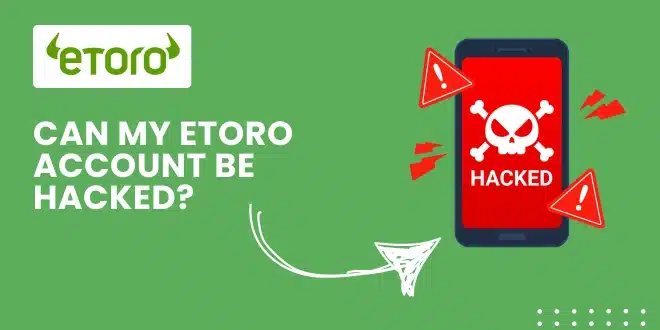You worked hard for your money. You trusted eToro to keep it safe. But in a world full of hackers and scams, it’s natural to wonder: Can my eToro account be hacked?
You’re not alone — and you’re smart to ask. In this guide, we’ll walk through how secure eToro really is, what risks exist today, what real traders are experiencing, and most importantly, how you can protect yourself.
How secure is eToro?
eToro takes security very seriously. It’s regulated by major financial authorities like the FCA (UK), ASIC (Australia), and CySEC (Cyprus). The platform uses several layers of protection:
- Encryption to protect your data. eToro uses SSL encryption to scramble your personal information and financial activity, making it unreadable to hackers who try to intercept it.
- Two-factor authentication (2FA). You can turn on 2FA to require a one-time code from your phone each time you log in, making it nearly impossible to hack your account with just a stolen password.
- Account monitoring for suspicious activity. eToro tracks unusual logins or changes in your behavior and can temporarily lock your account to prevent fraud.
- Segregated client funds. Your money is held in separate bank accounts, protected even if eToro faces financial trouble.
Still, no system on the internet is 100% invincible — your personal actions matter just as much as eToro’s security.
Real-world insights: What traders are saying
Looking across real trader conversations on Reddit’s r/etoro, Trustpilot reviews, and trading forums:
- Most breaches happen due to user mistakes. Many traders confessed that they clicked on fake emails or reused old passwords across multiple sites. Hackers often don’t need to “hack” anything — they just trick users into giving away their info.
- Platform-wide hacks are extremely rare. There are no widespread reports of eToro itself being hacked. Most incidents are isolated, caused by individuals being targeted.
- Support can vary in speed. Some users got help in 1–2 hours after a security breach; others waited longer, especially on weekends. Quick action and clear communication with support made a big difference in response time.
One user shared that after reusing a password from an old shopping site that got hacked, they noticed strange trades on their eToro account. Luckily, because they had 2FA enabled, the hacker couldn’t withdraw any funds.
These real-world experiences show: The platform is strong — but your habits are the real key to staying safe.
How can your eToro account be hacked?
Hackers usually target you, not eToro itself. Here’s how:
- Phishing emails: Fake emails pretending to be from eToro urge you to “confirm your account” or “fix a security issue” urgently. Clicking their fake links can give away your login credentials.
- Password breaches elsewhere: If you reuse your password on multiple sites and one of those gets hacked, hackers might try the same login info on eToro.
- Weak or reused passwords: Simple passwords or those used in many places are easily cracked by automated bots that guess thousands of combinations in minutes.
- No two-factor authentication (2FA) enabled: Without 2FA, a stolen password is often enough for full account access. With 2FA, the hacker would also need your phone, making it nearly impossible.
Practical steps to protect your eToro account from hackers
If you want to be safer than 90% of traders, these steps are critical:
- Use strong, unique passwords. Choose passwords that are long (at least 12 characters) and mix letters, numbers, and symbols. Never reuse passwords across sites.
- Enable two-factor authentication (2FA). With 2FA, even if a hacker steals your password, they still can’t log in without your personal device.
- Be suspicious of all emails. Always check if the email really comes from eToro’s official domain. If something feels rushed or alarming, it’s a red flag.
- Update passwords regularly. Refresh your passwords every few months. Think of it like changing the locks on your house to stay ahead of burglars.
- Monitor your account activity. Regularly check login history and trading activity in your account settings. Act fast if you spot anything strange.
- Secure your email with 2FA. Your email is the “master key” to resetting your trading account. Make it your strongest line of defense.
- Use antivirus software. Up-to-date antivirus software helps catch keyloggers, malware, and spyware that could steal your login info without you realizing.
By stacking these habits, you build a wall around your account that most hackers simply won’t bother trying to climb.
Quick Security Checklist Before You Trade on eToro:
- Strong, unique password set?
- Two-factor authentication enabled on both eToro and your email?
- Verified that your email address is secure and updated?
- Device protected with antivirus software and system updates?
- Avoid public Wi-Fi unless using a secure VPN?
- Account activity reviewed regularly?
If you checked all these boxes, your eToro account is already much safer than average.
What happens if your eToro account is hacked?
If you suspect any suspicious activity:
- Contact eToro support immediately. Submit a high-priority support ticket or use their live chat if available.
- Request a temporary freeze on your account. Freezing trading prevents hackers from moving your funds or making risky trades.
- Change your passwords fast. Secure your eToro, email, and any linked financial accounts.
- Review your recent activity. Look for unfamiliar trades, withdrawals, or profile changes.
- Disconnect suspicious devices. eToro allows you to remove unknown devices from your login list.
The sooner you act, the more you limit potential damage.
Conflicting reports: Is eToro support fast enough?
Real-world reports show a mixed picture:
- Fast responses (1–2 hours): Often when users reported urgent security issues early in the week (Monday–Wednesday).
- Slower responses (12–24 hours): More common on weekends or after-hours. Some users also noted slower help when they only emailed instead of opening a ticket.
Pro tip: When contacting support, include clear details (username, last login, suspicious actions) to speed things up.
Final thoughts: Can my eToro account be hacked?
No online account is completely immune to hacking. But eToro is one of the safer platforms out there, thanks to its strong regulations, encryption, 2FA, and active account monitoring.
The biggest threat isn’t eToro — it’s weak personal security habits. The good news? You have full control to make your account extremely difficult to hack.
By building smart habits today, you can trade with confidence — knowing your hard-earned money and future investments are protected.
Online trading should feel exciting, not stressful. Stay smart. Stay secure. Stay focused on your goals.
FAQs
1. Is eToro a safe platform to trade on? Yes, eToro is regulated by top-tier financial authorities and uses strong security measures. Most hacking risks come from user mistakes, not the platform itself.
2. What is the biggest risk to my eToro account? Using weak passwords, skipping two-factor authentication, and falling for phishing scams are the biggest risks to your account’s safety.
3. How do I enable two-factor authentication (2FA) on eToro? Log into your account, go to Settings > Security, and turn on 2FA. You can link it to an authenticator app like Google Authenticator for better protection.
4. If my eToro account gets hacked, will I lose all my money? If you act quickly by contacting support and freezing the account, you can often prevent major losses. Time is critical.
5. How often should I change my eToro password? Experts recommend updating your password every 3–6 months, or immediately if you suspect a breach.
6. Can eToro refund my money if I get hacked? Refunds depend on the investigation. If the hack happened without fault on your part, eToro may assist. But if poor personal security caused the breach, recovery is less certain.
7. Does using public Wi-Fi increase the risk of getting hacked? Yes. Public Wi-Fi can be insecure. Always use a VPN when trading or accessing sensitive accounts over public networks.


